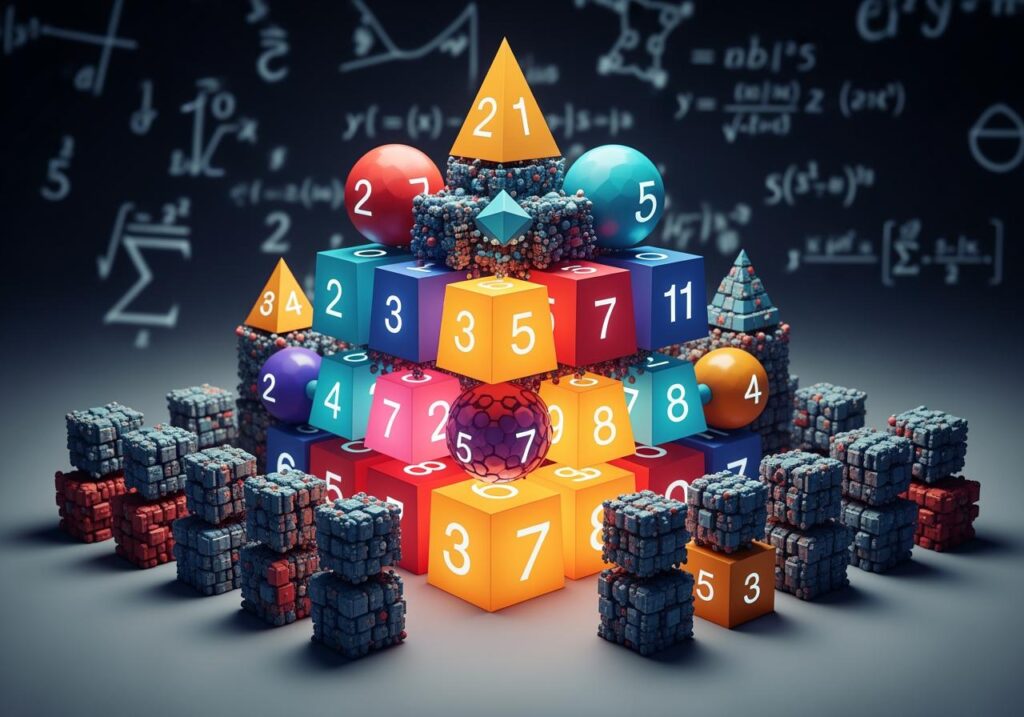
Prime Numbers: The Building Blocks of Maths
Discover the special numbers that can only be divided by 1 and themselves!
🌟 What are Prime Numbers?
Imagine numbers are like building blocks. Prime numbers are the most special, basic blocks! A prime number is a whole number greater than 1 that can only be divided exactly by two numbers: 1 and itself. That’s it! They have no other factors.
🔢 What Makes a Number Prime?
To figure out if a number is prime, we just need to check its factors. Factors are numbers that multiply together to get another number.
Let’s look at the number 7.
The only whole numbers that multiply to make 7 are:
$$1 \times 7 = 7$$
The factors of 7 are just 1 and 7. Since it only has two factors, 7 is a prime number!
Now let’s check the number 5.
The only whole numbers that multiply to make 5 are:
$$1 \times 5 = 5$$
The factors of 5 are just 1 and 5. So, 5 is also a prime number!
Heads up! The number 1 is NOT a prime number. It only has one factor (itself), but prime numbers must have exactly two different factors.
Also, the number 2 is the ONLY even prime number. Every other even number can be divided by 2, so they have more than two factors.
⚖️ Prime vs. Composite Numbers
So, if a number isn’t prime, what is it? It’s called a composite number. Composite numbers are whole numbers greater than 1 that have more than two factors.
Let’s test the number 6.
What numbers can we multiply to get 6?
- $1 \times 6 = 6$
- $2 \times 3 = 6$
The factors of 6 are 1, 2, 3, and 6. That’s four factors! Since 6 has more than two factors, 6 is a composite number.
What about the number 9?
- $1 \times 9 = 9$
- $3 \times 3 = 9$
The factors of 9 are 1, 3, and 9. That’s three factors. So, 9 is a composite number.
🕵️♀️ How to Find Prime Numbers
A fun way to find all the prime numbers up to 100 is by using the ‘Sieve of Eratosthenes’. It sounds complicated, but it’s just a way of filtering out the composite numbers!
Imagine you have a grid of numbers from 1 to 100.
- Step 1: Cross out the number 1 because it’s not prime.
- Step 2: Circle 2 (the first prime number), then cross out all the other multiples of 2 (4, 6, 8, 10, and so on).
- Step 3: Move to the next number that isn’t crossed out, which is 3. Circle it, then cross out all the other multiples of 3 (6, 9, 12, etc.).
- Step 4: The next available number is 5. Circle 5 and cross out all its multiples (10, 15, 20…).
- Step 5: Keep doing this. The next number to circle would be 7, then 11, and so on.
When you’re finished, all the numbers left circled are the prime numbers!
The first few prime numbers are: 2, 3, 5, 7, 11, 13, 17, 19, 23, 29…
They are the essential building blocks for all other numbers!
Practice Problems
Test your knowledge with these problems. Click 'Show Answer' to see how you did!
1. Is the number 13 a prime number or a composite number? Why?
Show Answer
Prime.
The only factors of 13 are 1 and 13. Since it has exactly two factors, it is a prime number.
2. List all the factors of 18. Is 18 prime or composite?
Show Answer
Composite.
The factors of 18 are 1, 2, 3, 6, 9, and 18.
Since 18 has more than two factors, it is a composite number.
3. Which of these numbers are prime: 1, 15, 23, 27?
Show Answer
The only prime number in the list is 23.
- 1 is not prime (it only has one factor).
- 15 has factors 1, 3, 5, 15 (composite).
- 23 has factors 1, 23 (prime).
- 27 has factors 1, 3, 9, 27 (composite).
4. Why is the number 2 a special prime number?
Show Answer
The number 2 is special because it is the only even prime number. All other even numbers can be divided by 2, meaning they will always have more than two factors.
Interactive Quiz
Ready to check your understanding? Choose the best answer for each question below.
